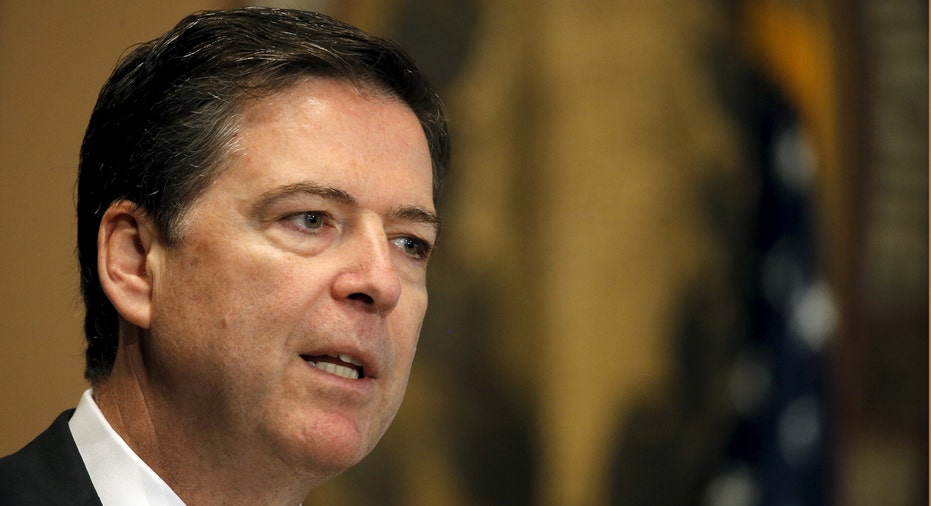GOP Lawmakers Press FBI Chief Over Lack of Consequence for Clinton

FBI Director James Comey strongly defended his decision not to recommend charges against Hillary Clinton on Thursday but told Republican lawmakers penalties such as revoking security clearances could be considered for mishandling classified information as Clinton and her staff did.
House of Representatives Speaker Paul Ryan said in a letter to Director of National Intelligence James Clapper that Clinton, the presumptive Democratic presidential nominee, should be denied classified briefings during her campaign.
Presidential candidates normally get access to classified information once they are formally nominated and a Clinton spokesman said Republicans' efforts to deny her the briefings was "another blatantly political stunt."
Comey, under persistent questioning at a hearing of the House of Representatives Oversight Committee, said if an FBI agent had acted as Clinton did, he would take their behavior into consideration before granting their pay, employment and access to secure information.
But Comey insisted that Clinton did not break the law.
"The question I always look at is, is there evidence that would establish beyond a reasonable doubt that somebody engaged in conducted that violated a criminal statute. And my judgment here is there is not," Comey said.
The issue of Clinton's use of private email servers has cast a cloud over her campaign leading up to the Nov. 8 presidential election, raised questions among voters about her trustworthiness and given her Republican presidential rival, Donald Trump, an avenue of attack.
Comey had disappointed some Republicans by only rebuking Clinton, not recommending charges against her, in a Tuesday announcement for what he called "extremely careless" handling of classified information while using private email servers for business.
"I think there is a legitimate concern that there is a double standard, if your name isn't Clinton or you are not part of the powerful elite that Lady Justice will act differently," Representative Jason Chaffetz, chairman of the House Oversight Committee, said to Comey.
A Democratic member of the committee, Representative Elijah Cummings of Maryland, defended Comey's actions by saying, "I firmly believe your decision was based on conviction, not convenience."
Comey said his FBI team had conducted its investigation "in an apolitical and professional way" and he had no reason to believe Clinton had lied to the FBI. Clinton had said publicly she never sent or received any classified information.
The hearing took place as Trump met with Republican lawmakers on Capitol Hill to get them behind his campaign.
"I'm going to make you proud," Trump told House Republicans, according to a participant, Representative Tom Flores.
Ryan, who has been critical of Trump at times but endorsed him on June 2, said Trump and Republican House members had "a great meeting."
"EXTREMELY CARELESS"
Comey's testimony to the House Oversight Committee marked the first time he has taken questions publicly since his announcement this week that the FBI was not recommending charges against Clinton. U.S. Attorney General Loretta Lynch has accepted the FBI recommendation and was to appear at another hearing next Tuesday.
Comey said on Tuesday that 110 classified emails passed through Clinton's servers, which were not kept on a secure government server. He rebuked her for "extremely careless" handling of classified information but said no reasonable prosecutor would charge her or her staff criminally.
The Clinton campaign said it was pleased by the FBI's announcement and said the Republican-led call for Comey's hearing a "taxpayer-funded sham of an inquiry" intended to hurt Clinton politically.
Comey, a Republican who was appointed by Democratic President Barack Obama and also served in the administration of former Republican President George W. Bush, has built a reputation as a straight shooter who does not bend to pressure from either party.
He has differed sharply with the Obama administration, most recently on gun control and whether high-profile police brutality cases had inhibited law enforcement from stopping crime.
Questions about the propriety of Clinton's use of unauthorized email servers in her Chappaqua, New York, home have raised questions about her judgment from across the political spectrum.
Despite clinching the Democratic presidential nomination, Clinton can expect a further onslaught of attacks from Trump, the presumptive Republican presidential nominee, who has accused her of playing by a different set of rules from the American public.
"Hillary Clinton can't keep her emails safe, and you know what, folks, she sure as hell can't keep our country safe," Trump told a recent rally in Raleigh, North Carolina, charging that the investigation was "rigged" in Clinton's favor.
Comey left the door open for other actions in the case, including downgrading security clearances for anyone who mishandles classified information as Clinton and her staff did.
(By Julia Edwards and David Alexander; Additional reporting by Susan Cornwell and David Alexander, writing by Steve Holland; editing by Peter Cooney and Bill Trott)



















